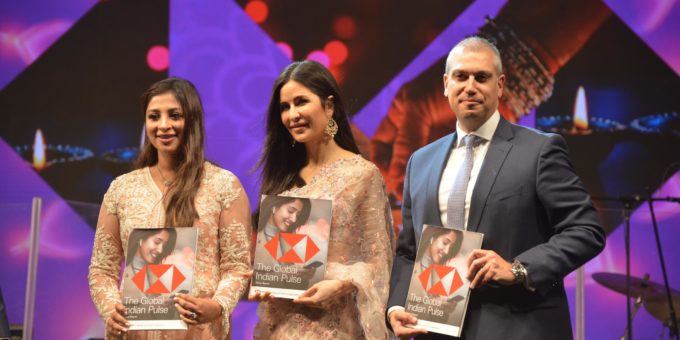
HSBC launched its first ever Global Indian Pulse at Expo 2020 Dubai in an inaugural live panel discussion featuring leading Indian cinema actress Katrina Kaif.
The Indian diaspora is the largest migrant population in the world and yet there is limited data looking at how they view the countries where they live, and also the strength and importance of their connections back to India.
HSBC’s first edition of The Global Indian Pulse is said to be the most comprehensive cross-border study into Global Indian attitudes of its kind.
The study examines the attitudes of 4,152 people across nine markets with a prominent Global Indian presence. It provides compelling evidence and new understanding of the emotional and financial contribution that ties three generations of Global Indians to both India, and to the countries that they were either born in, live in, or have settled in.
Richa Goswami, Global Head of Customers and International at HSBC, said: “Today, the exchange of ideas, culture, money, and goods flow around the world more freely than ever before, and the global connections people make and maintain are a vital part of this. As the world’s largest migrant population, Global Indians have a significant role to play here, and as a Global Indian myself I see first-hand the importance of these shared connections and sense of pride in the future of India.
“Our report brings to life the huge contribution Global Indians make to the success and prosperity of both the countries where they live and India, through their connections to family and friends, their business ties, and cultural links, as well as their growing investments.
“These connections bring security, new perspectives, and growing ideas, all of which can help us to understand how we can open up a world of opportunity for our customers wherever they are.”
Some 80 per cent of Global Indians surveyed are making investments of some sort in India – compared to 85 per cent in their country of residence – and 59 per cent are planning to increase their investments in both India and their country of residence in the next last three years.
The research found the Global Indians surveyed maintain strong connections back to their homeland regardless of whether they are first, second or third generation. More than three quarters (77 per cent) said they felt a strong connection with India, and four fifths (80 per cent) are very interested in the future success of India.
Even for those who have never lived in India, the connection remains strong, with the third generation Global Indians surveyed feeling just as attached to India as those who were born there. The data reveals the feeling of missing India means different things to different generations and could be experienced through family, food, friends, culture or religion: Professor Jaideep Prabhu, Jawaharlal Nehru Professor of Indian Business & Enterprise at the Judge Business School, University of Cambridge said: “There is a huge vibrancy and an incredible untapped economic opportunity associated with India. This potential transcends traditional investments, like stocks, shares and property, and goes much deeper into the two-way flows of talent, capital, technology and access to markets between India and Global Indians’ countries of residence. Global mobility also strengthens connections, enabling greater innovation and cultural links across borders and all the associated benefits that come with this.”
Historic reporting has highlighted the phenomenon of a ‘brain drain’ from India, however the Global Indian Pulse supports more recent thinking which shows more of a flow of people and ideas both to and from India.
The report examines whether Global Indians plan to either return or live in India in the future, and while just 4 per cent of Global Indians surveyed have never visited India, three fifths (61 percent) report they are planning to live in India at some stage in their lives.
However, in keeping with the concept of ‘brain circulation’ this is not necessarily a permanent move, with over three quarters (78 per cent) of second generation and more than four fifths (82 per cent) of third Generation Global Indians surveyed saying they still plan to retire in their current country of residence.









